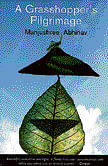
The grasshopper’s pilgrimage
Manjushree Abhinav
Rupa & Co, 2009,
pp 171, Rs 150
It takes the readers gently along its path without subjecting them to heavy sermonising or hard-core philosophising.
Reflective, evocative, humourous and very, very readable, that is The Grasshopper's Pilgrimage, as it follows beautiful young Gopika through her inward journey to find that irresistible, intangible something that can set her at peace. She seeks this elusive thing - call it truth, God, her own inner self or peace - in holy books, gurus, ashrams, sermons, mountains, road-side babas and meditation. Numerous jobs are lost on the way and her family's very sanity is threatened as Gopika traverses various physical and emotional landscapes in her spiritual quest. It does not help that her family is atheist and both sets of grandparents one-time revolutionaries. This makes her an unlikely seeker and her journey even lonelier.
Those who've trodden Gopika's path, those who've wondered at the purpose of life, sought truth or God at sometime in their lives will immediately take to this largely autobiographical book. Gopika learns from one of her gurus that she, indeed the whole of humanity, is but a mere screw in the universe's great machinery - a screw without a will of one's own. Haven't we all at sometime or the other felt this way?
From Kolkota to Mumbai to Thiruvannamalai and guru to guru she hops like a grasshopper in search of a spiritual high. In Thiruvannamalai she finds peace in spite of the crowd, as her guru had promised. There is a lilting, uplifting feeling of oneness with the writer as the mountain Arunachala beckons and she is drawn towards it like a lover.
She finds her bliss in doing a pradakshina around Arunachala or watching him tower into the clouds, and we have no reason to disbelieve her.
This Gopika who seeks the divine through the rigorous emptying of her mind in the Vipassana technique or in the overwhelming presence of Arunachala, the one who leads a hippie life in Thiruvannamalai for sometime (rolling chapattis by night in exchange for boarding and lodging, and painting the mountain by day) is also a Gopika lay readers can identify with. For, like them, she has her share of confusions, heartaches and doubts. You can find it in the way she seeks love or in desperation even thinks of settling down in an arranged marriage. There is nothing uppity about Gopika, no sense of superiority deludes her just because she is on a lofty spiritual quest. Even the language Manjushree Abhinav employs is the unpretentious, simple, everyday kind. It is a quiet voice that flows for the reader to lap up with ease.
Another point that the lay reader will find endearing is that her spiritual quest is not the sacrificing, punishing kind. She seeks the truth rooted in the ordinary. Neither does her quest take her away from her family. She returns to them every time, even discovering a friend in her grandmother. That brings her spiritual tryst to the everyday level and therefore anyone who reads it will find a bit of Gopika in themselves. Read this book for it will touch your soul in a way a heavy, practical spiritual guide never will.